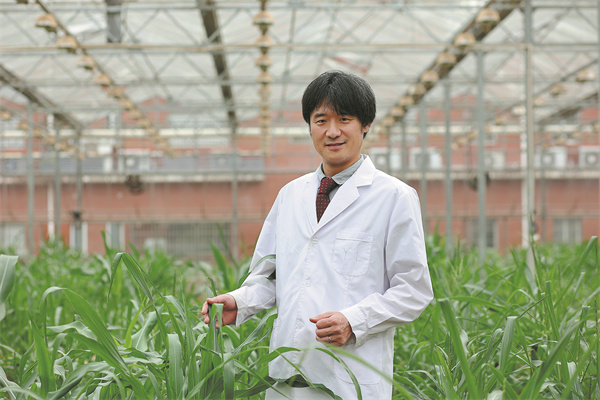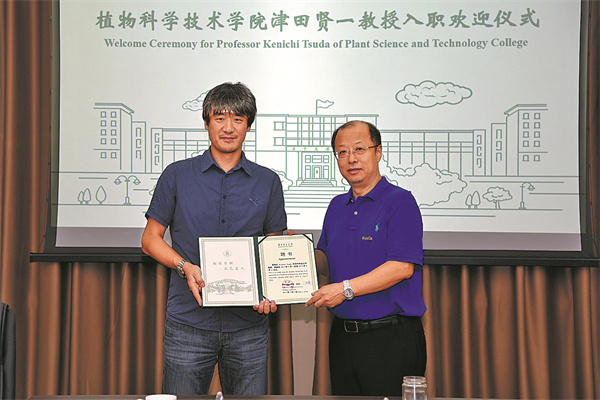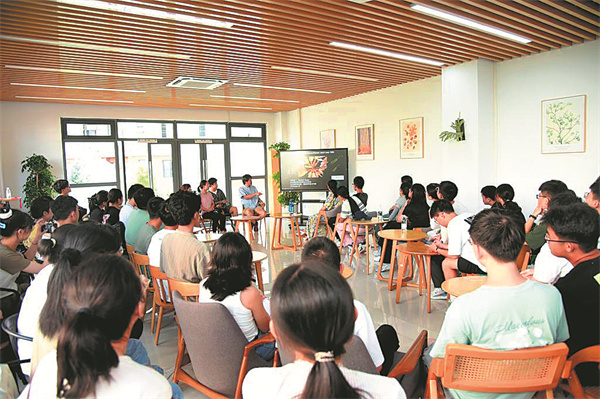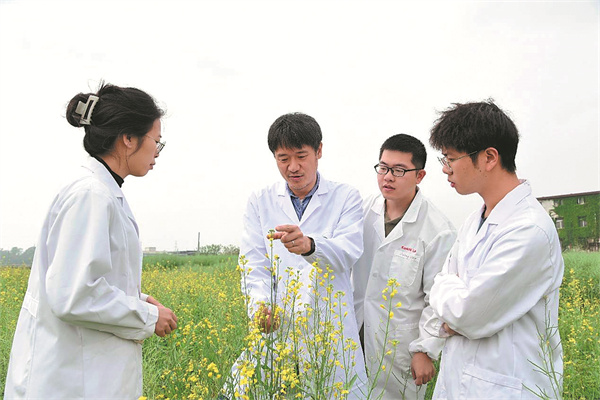
Japanese Professor Kenichi Tsuda received the 2024 Chinese Government Friendship Award for his contributions to researching plant immunity. [Photo / China Daily]From the moment Kenichi Tsuda first delved into the intricate tales of the Romance of the Three Kingdoms, he was captivated. The narratives of loyalty, strategy and ambition sparked a lifelong passion for that part of Chinese history, compelling him to explore countless comics and novels.
Yet, little did he know that a real-life encounter would mirror one of the most famous stories from that era—Liu Bei's legendary three visits to Zhuge Liang.
It was Sept 27, 2018, in Wuhan, Hubei province, when Tsuda, having just delivered a presentation at an academic conference, found himself approached by a figure of significant stature.
Professor Yan Jianbing, then dean of the College of Plant Science and Technology at Huazhong Agricultural University, extended an unexpected invitation. Initially not taking it too seriously, Tsuda was soon reminded of the fateful story, one that he cherishes, when two heartfelt follow-up invitations arrived in the following two days.
Fast-forward five years, and Tsuda has not only accepted that invitation but has also flourished in his role, building a pioneering research team in plant immunity that stands at the forefront of international science.

Kenichi Tsuda's official appointment as professor at the College of Plant Science and Technology at Huazhong Agricultural University on Sept 1, 2019. [Photo / China Daily]On Sept 30, the 48-year-old Japanese professor was honored in Beijing with the prestigious 2024 Chinese Government Friendship Award, a recognition that he reflects upon with humility and gratitude.
"I feel very honored to receive this award, "says Tsuda, acknowledging the company he now keeps among distinguished recipients, many of whom are in their 70s or Nobel laureates. "As a relatively young awardee, it's a bit unexpected for me. I want to continue to be a good scientist and supervisor until I retire. "
In the past five years, Tsuda has swiftly built a well-structured research team at Huazhong Agricultural University, currently comprising two professors, three postdoctoral researchers, and nearly 50 graduate and undergraduate students.
Under his leadership, the team has actively engaged in scientific research on plant-microbe interactions, achieving international recognition for their studies on the molecular mechanisms regulating pathogen growth and behavior in plant immunity.

The professor gives a presentation to 2024 freshmen. [Photo / China Daily]Tsuda has not only led efforts to apply for various national and provincial research projects but has also played a significant role in developing the university's research infrastructure, including the establishment of the plant-microbe interaction research center at Huazhong Agricultural University.
As an international scholar in the fields of plant immunity and plant microbiomes, Tsuda has fostered collaboration and exchange since joining the university in 2019, organizing multiple international conferences that enhance academic exchanges and partnerships between faculty, students and foreign scholars.

Tsuda offers advice to students on plant growth. [Photo / China Daily]Nurturing young talent
As his team grows, Tsuda feels a profound sense of responsibility and has dedicated himself to talent development since he began his tenure five years ago. "I also hope to continue nurturing young talent, "he says.
He developed a course fully taught in English on Molecular Plant Pathology for undergraduates and participates in the reform and development of English-language courses, inviting internationally renowned experts to teach in China.
Tsuda is also actively involved in extracurricular programs like Face-to-Face with Young Scholars, guiding students to explore the frontiers of science and cultivate their research interests.
At the beginning of this new semester at the end of August, Tsuda delivered a talk titled Meet with the Bigger World for incoming freshmen, discussing the intersection of research and life at the university.
After sharing his educational journey through Japan, Germany, the United States, and now China, he reflected on how these diverse cultural experiences have enriched his life.

Graduate students, under his supervision, observe plants in a greenhouse. [Photo / China Daily]He explained to students how to distinguish between a plant's"friends"and"enemies". Using examples from corn and bananas, he illustrated the dangers posed by pathogens to crops and the principles of using microbes to address these threats.
"Understanding how plants deal with these kinds of friends or enemies helps us create better agriculture, "he says. "With more harvests in agriculture, people have more food, which provides food security to the world. It's important. "
He also advised students to read widely during their university years to build knowledge;not to take criticism to heart and to maintain a balanced mindset;develop personal relationships and establish broad connections;and enjoy the small pleasures in scientific research and life.
Currently pursuing a doctoral degree, graduate student Ding Miaomiao witnessed the journey of Tsuda's team from an empty laboratory to three fully equipped rooms filled with reagents, instruments, supplies, and students, starting from the moment Tsuda and his family arrived in Wuhan.
"I feel very fortunate to be his student. He doesn't criticize students;instead, he encourages us and respects our wishes, "she says.
Ding reflected on her own growth, noting how she went from being hesitant to speak English to now engaging in normal conversations. "All of this is thanks to my mentor's guidance, "she adds.
In Ding's memory, when she first entered the laboratory, she felt a significant lack of skills in literature review, presentation, and experimental techniques. Understanding this, Tsuda organized weekly group meetings to explain his research and share knowledge in the field.
"During these meetings, he would first present and introduce us to various concepts, and then encourage us to speak. It was like a course where the mentor shared all his research directions, fields, methods and ideas, "Ding says.

He guides graduate students in experiments. [Photo / China Daily]Even now, as the laboratory team has grown, Tsuda continues to hold one-on-one discussions with each student every one to two weeks.
"We talk about the development of our projects and the latest experimental progress, which has greatly motivated me to advance my research, "Ding says.
Under the careful guidance of Tsuda, many young talents in the team have emerged successful. Some students have been selected for nationally funded postdoctoral research programs and national graduate scholarships.
After graduating, his students have successfully continued their studies at prestigious institutions such as Peking University, Imperial College London, and Kyoto University, thanks to his recommendations.
"Chinese people work very hard and very fast. That also gives me so much motivation, "Tsuda says.
He also frequently invites internationally renowned experts to the university for communication and online academic presentations. "I hope to promote more international exchange and collaboration in the future, "he says.
When invited to participate in international academic conferences, Tsuda often highlights China's strong research capabilities and advanced scientific conditions, encouraging foreign researchers to engage in academic exchanges in China.
He has successfully referred several outstanding young foreign talents to work full time at domestic universities and research institutions.
According to his colleague, Professor Han Xiaowei from the College of Plant Science and Technology at Huazhong Agricultural University, Tsuda is a very kind and considerate person.
The two guide their respective students, primarily overseeing their own research topics, but they also hold joint meetings where they offer each other suggestions.
"We collaborate on research, and there has never been any conflict between us. We often joke that we have a brotherly relationship. From my perspective, I feel like I'm always observing and learning from him. Whether in research or in how to conduct oneself, there's so much to learn, "Han says.
As a Japanese scholar who is well-versed in the Romance of the Three Kingdoms and enjoys Chinese cuisine, Tsuda moved his family to Wuhan in 2019 when his three children were aged 3, 5, and 7. The whole family has been diligently learning Chinese and integrating into the local culture.
Currently, his children are taking language courses alongside their Chinese peers. Tsuda hopes they will one day serve as ambassadors of friendship between China and Japan.
"I hope that through me, my children, and my family, we can continuously enhance mutual understanding and friendly relations between the Chinese and Japanese people, "he says.





